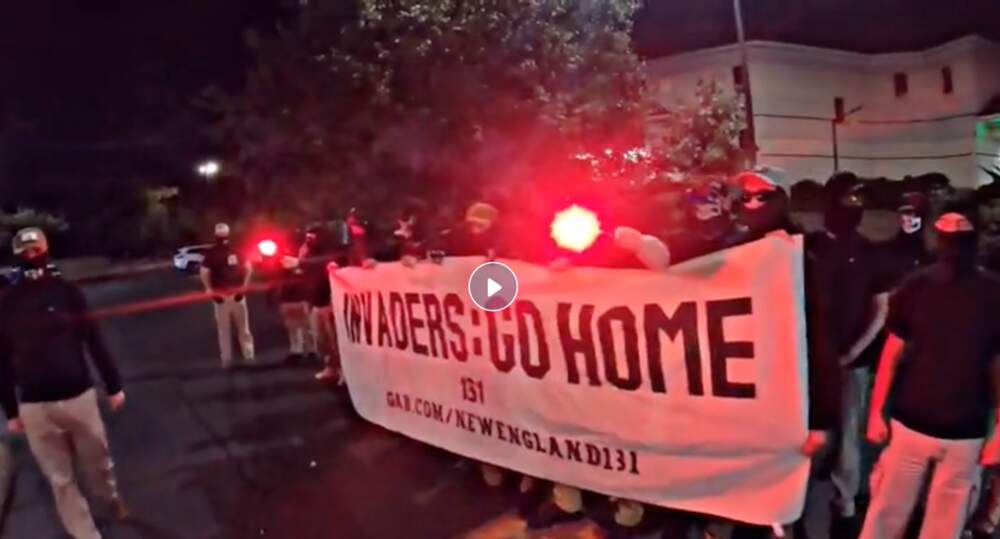Advertisement
At hotels sheltering migrants, fears about neo-Nazis grow
ResumeOf all the assistance Lino Covarrubias thought he needed to provide for new immigrant families resettling in Massachusetts, protection from extremist groups was not high on his list. Until now.
Covarrubias, head of Jewish Family Services of Metrowest, helps coordinate resources for some of the thousands of migrant families that have arrived in Massachusetts over the past several months.
His organization serves as the main liaison for 22 families, or about 65 people — nearly half of them children — initially placed in a Framingham hotel.
But, the families recently had to move after a hate group gathered outside the hotel to demonstrate, holding signs with messages such as "Invaders: Go home."
The neo-Nazi organization NSC-131 claimed responsibility for the action on social media. No arrests were made, but Covarrubias said after the demonstration, the hotel did not renew its contract to house migrant families.
Worries hate groups will grow ranks and escalate actions
Covarrubias spoke with WBUR in a parking lot down the street from the families' new hotel because management wouldn't allow media interviews on the property. He says hotel managers are nervous about identifying the location, and he worries the demonstrations by the hate group will escalate.
"This is an opportunity for this group to advance what they want to accomplish and, you know, build allies with misinformation and fear," Covarrubias said. "Right now, they're just demonstrating ... but we don't know if that might change."

In the past few weeks, authorities say NSC-131 has staged more than a half-dozen demonstrations at locations where the state is providing housing for migrant families, including sites in Quincy, Woburn and Marlborough.
Advocates and local media have reported the group is also distributing leaflets in some cities and towns aimed at recruiting new members. One flyer urges men "of European descent" to contact the group "to get to work."
The demonstrations and leaflets have sparked questions about what more the state, nonprofit organizations and law enforcement can do to protect migrants from hate groups.
Covarrubias says he tells his workers and volunteers to take precautions like knowing how to reach supervisors or law enforcement in emergencies, monitoring people who enter the hotel and making sure doors are locked at night. He's aware that his staff could be targeted, too.
"We have protocols such as taking off name tags with the name of our agency — Jewish Family Services — and urging our staff to be aware of their surroundings," Covarrubias said.
Working to protect immigrant families
Lucia Panichella, senior director of programs and partnerships at Jewish Family Services of Metrowest, says the staff tell families to be vigilant and to stay inside, with doors locked, if anything appears unsafe.
"There's not a lot that they can really count on right now," said Panichella. "So our staff tries very hard to make sure that they know that they can count on us, that the information that we're providing them is accurate, that we are doing our best to make sure that they're safe."
Jewish Family Services of Metrowest is one of several organizations providing services for migrants living in hotels and motels the state has rented as emergency family shelters. As of last week, more than 6,800 families were living the state's family shelter program overall, including more than 3,000 in hotels and motels. About half of the families in the system are new immigrants.
For the most part, the organizations helping families at hotel and motel sites rely on local police for security. Covarrubias said there are increased police patrols at the Framingham hotel, and his staff works to reassure the families that officers are there to keep them safe, despite some of their experiences with police in other countries.
"We make sure the families understand the security protocols," said Jennifer Stern-Robbins, who was recently hired by Jewish Family Services of Metrowest to translate for families who speak Haitian Creole. (A large portion of the new arrivals have fled Haiti.)
"They are aware of all that is going on [with the hate group], and we tell them the police are here to help," Stern-Robbins said.
'A false narrative'
Covarrubias and people from other aid organizations like his have asked Massachusetts officials to provide better information to the public about who the migrant families are, and why they're in the state, to help dispel fear. They've formed a task force and met with representatives from Gov. Maura Healey's office last month. Covarrubias says they wanted to collect information and discuss ways to collaborate.
"How do we watch the backs of direct service providers?" Covarrubias said. "We literally do not have time to worry about hate groups."
NSC-131 is a hate group that originated in Massachusetts in 2019, according to the Anti-Defamation League. It says the initials NSC stand for Nationalist Social Club, and the Southern Poverty Law Center has reported 131 is alphanumeric code for ACA, which stands for Anti-Communist Action. Members of the hate group consider themselves soldiers "fighting a war against a hostile, Jewish-controlled system that is deliberately plotting the extinction of the white race," according to the ADL.
The ADL and other organizations that track hate groups say the demonstrations outside shelters are meant to create fear.

"We're seeing hate groups, particularly the neo-Nazi group NSC-131, showing up at places and communities that are housing migrants," said Peggy Shukur, deputy regional director of the ADL of New England. "They are pretty much conveying a false narrative about who these folks are, and suggesting that they are unsafe and presenting some sort of security risk."
Another anti-hate group, Task Force Butler Institute, issued a report earlier this year that said NSC-131 is "primarily focused on incitement of assault, harassment and intimidation of religious, ethnic and racial minorities."
The report cited incidents in New England that its authors believe involved NSC-131, such as a public demonstration at a St. Patrick's Day parade in Boston last year, the disruption of a drag queen story hour in Jamaica Plain last year, a protest at a library in Providence, Rhode Island, in February and a protest in Portland, Maine, in April.
The report urged law enforcement to address the group more aggressively through both criminal and civil legal strategies. The authors argue that police should pursue lower-level charges such as harassment and intimidation, and authorities should seek to prosecute the group as a criminal gang.
Christopher Hood, the reported leader of NSC-131, lives in Newburyport. In a recent post on social media, he said the group has been able to stage demonstrations at hotels in Massachusetts without legal consequences, and he wants members to take further action.
"We need to get loud, we need to get aggressive, we need to be confrontational and we've got to win," Hood said in the video.
How hate groups often skirt legal problems
Legal approaches to this type of demonstration by hate groups can be a balancing act between protecting free speech rights and prosecuting hate speech. Legal experts say members of NSC-131 appear to understand their constitutional and other rights, and they often avoid criminal prosecution.
In New Hampshire, authorities charged Hood with trespassing and civil rights violations in connection with a banner placed on a highway overpass in Portsmouth that read: "Keep New England White."
A New Hampshire Superior Court judge supported a motion to dismiss the case, saying prosecutors were applying the state's trespassing laws too broadly. The New Hampshire attorney general's office has asked the court to reconsider.
"White supremacist groups, neo-Nazi groups, these kind of groups, they know what the First Amendment will protect and will not protect, and they will try to carefully tow that line," said Sean Locke, director of the office's civil rights unit. "We're looking at every possibility to make sure we are protecting the rights of everyone here in the state."
Depending on the judge's ruling, Locke said he may appeal to the state's Supreme Court.
All Massachusetts police officers are trained to identify hate crimes, according to local law enforcement agencies. A spokesperson for state Attorney General Andrea Campbell said her office did not have anything to add about the demonstrations or NSC-131, but it is "generally very concerned about the rise of hate and extremism both here in Massachusetts and across the country."
Campbell's office has an online form and a hotline to report "bias-motivated" threats.
Federal law enforcement officials say being a member of a hate group is not a crime, regardless of that group's beliefs, but the FBI would investigate violence or potential federal crimes.
Combatting hate
Some communities have expressed frustration over what they describe as a lack of communication about where the state is placing migrants, and a lack of funding to help them.
State Sen. Jamie Eldridge, a Democrat who represents Worcester and Middlesex counties, says he has visited some of the hotels in his district where about 200 migrant families are staying.
Last month, he met with families at a Marlborough hotel shortly after a white supremacist demonstration there. He says he understands how a lack of communication [about the migrants' situations] could help incite extremism.
"In talking to many of my colleagues across the state, we are supportive of the migrant families," Eldridge said. "The challenge is to make sure that the communication is clear between the [Healey] administration and our communities."
Healey has deployed 250 National Guard members to help staff some of the hotels and motels where migrants are staying. Agencies that provide services at these sites say the guard members do not provide security.
The Massachusetts Municipal Association is surveying towns and cities to gather data about where migrant families are living and which agencies are helping them. Executive Director and CEO Adam Chapdelaine said his group is holding biweekly sessions with the Healey administration to increase communication. He says strategies to deal with potential hate group demonstrations are being worked out at the local level.
"I would imagine that at cities and town halls across the commonwealth, these conversations are happening, and their leaders will be prepared to manage these challenging circumstances as best possible, while balancing the right to protest with the right to public safety," Chapdelaine said.
Advocacy groups and organizations that provide services for immigrants say the most effective way to deter hate groups is to show support for the immigrants coming to Massachusetts. They point to a large counter-demonstration held in Quincy last month after an anti-migrant protest there, and the number of volunteers stepping up to help migrants staying in hotels and motels.
"The feeling that is generated by the volunteer outpouring I hope would outweigh any kind of hate incidents that happened outside any of these motels," said Cindy Rowe, president and CEO of the Jewish Alliance for Law and Social Action. "We just want the migrant families to know that they are welcome and the vast majority of people in Massachusetts understand that and are willing to come out and stand up for them."
The Massachusetts attorney general’s hotline to report incidents of bias-motivated threats, harassment and violence is 1-800-994-3228. If you believe a company, business or organization has violated your rights, you can file a civil rights complaint here.
This segment aired on October 11, 2023.
